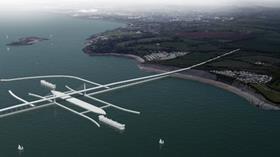The government says developer Hafren Power has failed to make a strong case for the scheme

The government has ruled out proceeding with Hafren Power’s plan for a tidal barrage in the Severn estuary, at least until the developer can put together a more convincing case for the £25bn scheme.
In its response to a report by the energy and climate change committee report on the plans for the £25bn Severn Barrage the government said that in “its current form, the Hafren Power proposal for a Severn barrage does not demonstrate that it could deliver the benefits it claims it would achieve”.
Developer Hafren Power has claimed the scheme, which is being drawn-up by engineers Mott MacDonald, URS, Bechtel and Arup, would generate 16.5 terawatt hours per year, enough to meet 5% of the UK’s electricity needs.
The government’s move followed the select committee’s report, which concluded that Hafren Power’s case for the tidal barrage was “unproven” and that the environmental impact of the barrage was “very considerable” with “a high risk of unintended and possibly damaging consequences”.
In its response to the select committee’s report, the government said it could not see a case for public investment in a Severn barrage, though it had not ruled out a “privately-funded scheme coming forward”.
The government said: “The Severn estuary has great potential. However, the government recognises that a traditional tidal barrage is not the only way of exploiting the outstanding resource of the Severn estuary.
“The government remains keen to hear about well-developed proposals for harnessing the power of the Severn estuary - be it through a barrage or other means.
“However any such scheme would need to credibly demonstrate strong evidence of value for money, economic benefits, energy saving and environmental impact mitigation before the government could take a view on its potential.
“It is clear from the report that the Energy and Climate Change Committee shares the Government’s view on the level of development of the Hafren Power proposal.
“In its current form, the Hafren Power proposal for a Severn barrage does not demonstrate that it could deliver the benefits it claims it would achieve.”
However, the government’s response added that it would give further consideration to Hafren Power’s proposal if the developer could provide “much more detailed, credible evidence”.
It said this would need to include:
- In-depth study of environmental impacts. This would require both baseline studies and estimation of likely effects
- Detailed environmental compensation and mitigation plans
- Further information on turbines including: modelling of impacts, plans to move from concept stage to commercialisation, including in-situ testing
- Gaining commitment to the project from low head turbine manufacturers
- Evidence to substantiate claims of how much of the proposed benefits can be delivered
- Extensive stakeholder consultation including a clear, understandable breakdown of the level of public support the developer thinks they would need and a thorough, robust evidence base to support this
- Analysis of impacts on upstream ports and navigation and mitigation plans
- Detailed evidence supporting job creation figures
- Detailed evidence of the flood impact figures
Hafren Power has been contacted for comment.
Following the publication of the committee’s report in June, Tony Pryor, chief executive of Hafren Power, said he was aware there was more work to do: “The government has already told us it is not against the barrage and we are determined to press ministers and officials to engage fully. We believe the environmental and economic issues can be solved with everyone working together.”


























No comments yet